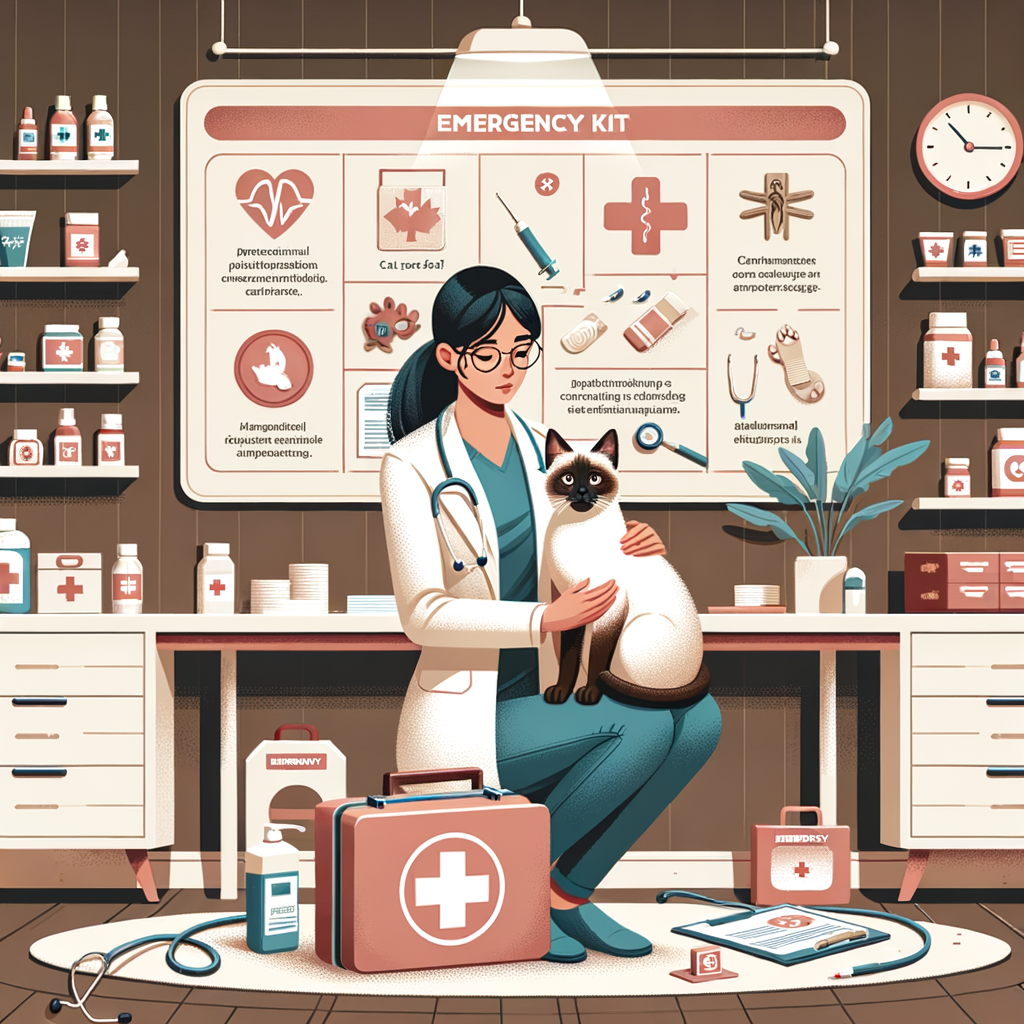
Introduction to Siamese Cat Health
Siamese cats are known for their striking features and playful personalities. However, like all breeds, they have their own unique set of health considerations. In this section, we will provide an overview of Siamese cat health and delve into some of the common health issues these cats may face.
- Overview of Siamese Cat Health
- Common Health Issues in Siamese Cats
Siamese cats are generally healthy, with a typical lifespan of 15 to 20 years. However, they can be prone to certain genetic health problems. Regular vet check-ups, a balanced diet, and plenty of exercises can help ensure your Siamese cat stays in the best possible health.
While Siamese cats are generally healthy, they are prone to certain health issues more than other breeds. These include respiratory problems, dental diseases, and heart diseases. Let’s take a closer look at these issues:
| Health Issue | Description |
|---|---|
| Respiratory Problems | Siamese cats can be prone to respiratory issues due to their short noses. Symptoms can include sneezing, coughing, and difficulty breathing. |
| Dental Diseases | Like all cats, Siamese cats can develop dental diseases. Regular brushing and dental check-ups can help prevent these issues. |
| Heart Diseases | Siamese cats can be at risk for certain heart conditions, such as hypertrophic cardiomyopathy. Regular vet check-ups can help detect these issues early. |
Remember, while this list covers some of the more common health issues in Siamese cats, it’s not exhaustive. Regular vet visits are crucial for early detection and treatment of any potential health problems.
Emergency Care for Siamese Cats
Siamese cats, like any other pets, can face health emergencies. Knowing how to recognize these emergencies and when to seek immediate veterinary care is crucial to ensure the well-being of your Siamese cat.
Recognizing Emergencies
Recognizing a health emergency in your Siamese cat can be challenging, especially if you are a new pet owner. However, there are certain signs that can indicate a potential health issue. Let’s take a look at these signs.
- Signs of a Health Emergency in Siamese Cats
- Unusual behavior or lethargy
- Loss of appetite or excessive drinking
- Difficulty breathing
- Unexplained weight loss or gain
- Changes in their coat or skin
- When to Seek Immediate Veterinary Care
- Severe injury or trauma, such as being hit by a car or a high fall
- Difficulty breathing or constant coughing
- Seizures or loss of consciousness
- Signs of extreme pain, such as excessive vocalization or aggression
Siamese cats may exhibit various signs during a health emergency. These may include:
If you notice any of these signs, it’s important to monitor your cat closely and consult a vet if the symptoms persist.
Some situations require immediate veterinary care. These include:
In these situations, it’s crucial to remain calm and take your Siamese cat to the vet immediately.
Recognizing a health emergency in your Siamese cat and knowing when to seek immediate veterinary care can make a significant difference in your pet’s health. Always remember, when in doubt, it’s better to be safe and consult a vet.
First Aid for Siamese Cats
Knowing how to administer first aid to your Siamese cat can be a lifesaver. It’s crucial to understand the basic procedures and how to handle a cat in pain. Let’s delve into these two important aspects.
- Basic First Aid Procedures for Siamese Cats
- Assess the situation: Determine the severity of the injury or illness. Look for signs such as bleeding, difficulty breathing, or loss of consciousness.
- Keep calm: Your cat will sense your anxiety. Stay calm to help your cat remain calm too.
- Handle with care: If your cat is injured, handle them gently to prevent further injury.
- Seek professional help: After administering first aid, take your cat to the vet for further examination and treatment.
- How to Handle a Siamese Cat in Pain
- Recognize the signs: Cats often hide their pain. Look for changes in behavior such as loss of appetite, lethargy, or aggression.
- Comfort your cat: Provide a quiet and comfortable space for your cat to rest.
- Do not medicate without advice: Never give human medication to your cat. Always consult with a vet before administering any medication.
- Seek veterinary care: If your cat is in pain, it’s crucial to seek immediate veterinary care. Pain is often a sign of a serious underlying condition.
First aid is the immediate care given to a Siamese cat before professional medical help arrives. Here are some basic steps:
Recognizing and managing pain in your Siamese cat is essential. Here’s how to do it:
Remember, first aid is not a substitute for veterinary care. It’s meant to stabilize your cat until you can get them to a vet. Always consult with a professional when your Siamese cat is in pain or injured.
Preparing for Cat Emergencies
When it comes to our beloved Siamese cats, emergencies can happen at any time. It’s crucial to be prepared to ensure the safety and well-being of our feline friends. Let’s delve into how you can prepare for such situations.
Emergency Kit for Siamese Cats
One of the best ways to prepare for emergencies is to have a well-stocked emergency kit specifically designed for your Siamese cat. This kit should contain all the essential items your cat might need in an emergency situation.
- Essential Items for a Cat Emergency Kit
- Food and water: Keep at least a three-day supply of your cat’s favorite food and water in your kit.
- Medications: If your Siamese cat is on any medication, make sure to have a sufficient supply in your kit.
- First Aid supplies: Include items like bandages, antiseptic wipes, a digital thermometer, and a pet first aid book.
- Litter and litter box: These are essential for maintaining your cat’s hygiene during an emergency.
- Comfort items: Include a blanket and a few of your cat’s favorite toys to help reduce stress.
- Keeping Your Emergency Kit Updated
Here are some items you should include in your cat’s emergency kit:
It’s not enough to just have an emergency kit; you need to keep it updated. Check your kit every few months to ensure the food and medications are not expired, and replace any used or out-of-date items. Remember, an outdated emergency kit can be just as dangerous as not having one at all.
Preparing for emergencies is a crucial part of being a responsible Siamese cat owner. By having a well-stocked and updated emergency kit, you can ensure that you’re ready to handle any situation that may arise, keeping your beloved pet safe and healthy.
Emergency Preparedness
When it comes to emergencies, preparation is key. This is especially true when you have a Siamese cat in your family. Here are two crucial steps you can take to ensure the safety of your feline friend.
- Creating a Safe Space for Your Siamese Cat
- Planning for Evacuation with a Siamese Cat
Siamese cats are known for their curiosity and adventurous spirit. However, during emergencies, these traits can put them at risk. Creating a safe space for your Siamese cat is an essential part of emergency preparedness.
Choose a room in your house that can be easily secured and is free from potential hazards. This room should have a door that closes securely, no small spaces where a cat could hide and become trapped, and no heavy objects that could fall and cause injury. Stock this room with essential supplies, such as food, water, a litter box, and comfortable bedding. Your cat’s safe space should also include familiar items, like toys or a favorite blanket, to help reduce stress.
In some emergencies, evacuation may be necessary. Having a plan in place can make this process less stressful for both you and your Siamese cat.
First, identify a safe place where you can take your cat in case of evacuation. This could be a pet-friendly hotel, a friend or family member’s house, or a designated pet shelter. Always keep a carrier handy for safe transportation. Pack a bag with essential items, such as food, water, a leash, and any necessary medications. Remember to include your cat’s veterinary records and identification tags.
Practice your evacuation plan regularly to ensure that it runs smoothly in case of a real emergency. This will also help your Siamese cat become familiar with the process, reducing their stress and anxiety.
Remember, the key to successful emergency preparedness is planning ahead. By creating a safe space and planning for evacuation, you can ensure the safety and well-being of your Siamese cat in any emergency situation.
Siamese Cat Safety Tips
Siamese cats are known for their playful and curious nature. This makes them prone to accidents, especially when they are outdoors. Here are some tips to keep your Siamese cat safe and prevent common accidents.
- Preventing Common Accidents
- Keeping Your Siamese Cat Safe Outdoors
- Always supervise your cat when they are outside. This will help prevent them from wandering off and getting lost.
- Consider creating a secure outdoor enclosure or ‘catio’ where your cat can safely enjoy the outdoors.
- Ensure your cat is up-to-date with vaccinations and flea and tick prevention treatments.
- Teach your cat to come when called. This can be a lifesaver if they venture too far from home.
Siamese cats are agile climbers and jumpers. They love to explore high places, which can sometimes lead to falls and injuries. To prevent these accidents, ensure your home is cat-proofed. Remove any fragile items from high shelves and secure loose wires that your cat might chew on. Also, keep small objects that can be easily swallowed out of your cat’s reach.
Another common accident is poisoning. Siamese cats are curious and may ingest harmful substances. Always keep cleaning products, medications, and toxic plants away from your cat. If you suspect your cat has ingested a harmful substance, seek immediate veterinary care.
While it’s beneficial for your Siamese cat to spend time outdoors for exercise and stimulation, it also exposes them to potential dangers. Here are some tips to keep your cat safe outdoors:
In conclusion, while Siamese cats are adventurous and curious, they also need protection from potential dangers. By following these safety tips, you can ensure your Siamese cat stays safe and healthy.
Siamese Cat Health Guide
When it comes to maintaining the health of your Siamese cat, there are several key factors to consider. One of the most important is ensuring regular vet check-ups. These visits play a crucial role in keeping your feline friend healthy and happy.
Regular Vet Check-ups
Regular vet check-ups are an essential part of your Siamese cat’s health care routine. They help in early detection of any potential health issues, ensuring that your cat gets the necessary treatment in a timely manner.
- The Importance of Regular Vet Visits
- What to Expect During a Vet Check-up
Regular vet visits are crucial for your Siamese cat’s health. According to a study by the American Veterinary Medical Association, cats that receive regular veterinary care live longer and healthier lives. These visits allow the vet to monitor your cat’s weight, check for any signs of illness, and administer necessary vaccinations. They also provide an opportunity for you to discuss any concerns or questions you may have about your cat’s health.
During a vet check-up, the vet will typically examine your Siamese cat’s overall health. This includes checking the cat’s weight, heart rate, and temperature. The vet will also examine the cat’s coat, teeth, ears, and eyes for any signs of illness. They may also take a blood sample for further testing. It’s a good idea to keep a record of your cat’s behavior and any changes you’ve noticed, as this information can be helpful for the vet.
Remember, regular vet check-ups are a key component of your Siamese cat’s health care. By ensuring these visits, you’re taking a proactive step towards keeping your feline friend healthy and happy.
Nutrition for Siamese Cats
Feeding your Siamese cat a balanced diet is crucial for their overall health. This section will guide you on how to choose the right diet and understand your Siamese cat’s nutritional needs.
- Choosing the Right Diet for Your Siamese Cat
- Understanding Your Siamese Cat’s Nutritional Needs
Choosing the right diet for your Siamese cat can be a daunting task with so many options available. However, it’s essential to remember that Siamese cats, like all cats, are obligate carnivores. This means they require a diet high in protein. Look for cat food that lists a source of animal protein, like chicken or fish, as the first ingredient.
It’s also important to consider the age, weight, and health status of your cat. Kittens require more calories than adult cats, while overweight cats may need a diet food. If your Siamese cat has a health condition, such as kidney disease, they may require a special diet. Always consult with your vet before making significant changes to your cat’s diet.
Here’s a simple table to help you understand the basic nutritional needs of your Siamese cat:
| Age | Protein | Fat | Carbohydrates |
|---|---|---|---|
| Kitten | High | Moderate | Low |
| Adult | Moderate | Low | Low |
| Senior | High | Low | Moderate |
Understanding your Siamese cat’s nutritional needs is key to their health. As mentioned earlier, Siamese cats require a diet high in protein. They also need certain vitamins and minerals, like taurine and calcium, which are crucial for their heart and bone health, respectively.
Moreover, Siamese cats are prone to certain health issues, like dental disease and obesity. Feeding them a diet that promotes dental health and helps maintain a healthy weight can help prevent these issues. For instance, dry food can help keep your cat’s teeth clean, while portion control can prevent overeating.
Remember, each Siamese cat is unique and may have different nutritional needs. Regular vet check-ups can help monitor your cat’s health and adjust their diet as needed.
Siamese Cat Emergency Care
When it comes to our beloved Siamese cats, emergencies can happen at any time. It’s crucial to know how to handle these situations to ensure the safety and well-being of our feline friends. Let’s delve into the steps you should take when dealing with health emergencies.
Handling Health Emergencies
Health emergencies can be scary, but staying calm and knowing what to do can make a big difference. Here are some essential steps to follow:
- What to Do in a Health Emergency
- How to Comfort Your Siamese Cat During an Emergency
First and foremost, don’t panic. Your Siamese cat can sense your stress, which may make them more anxious. Assess the situation carefully. If your cat is unconscious, having trouble breathing, or showing signs of severe pain, contact your vet immediately. While waiting for professional help, keep your cat warm and quiet.
During an emergency, your Siamese cat may feel scared and anxious. Speak to them in a soft, soothing voice and gently stroke their fur if it’s safe to do so. Avoid sudden movements or loud noises that could startle them. Remember, your comfort can help them stay calm during this stressful time.
Handling health emergencies with your Siamese cat can be challenging, but with the right knowledge and approach, you can ensure your pet’s safety and comfort. Remember, always consult with a professional vet during these situations for the best care possible.
Post-Emergency Care
After your Siamese cat has experienced an emergency, it’s crucial to provide the right care to ensure a full recovery. This section will guide you through the process of helping your Siamese cat recover and monitoring their health post-emergency.
- Helping Your Siamese Cat Recover After an Emergency
- Monitoring Your Siamese Cat’s Health Post-Emergency
Once your Siamese cat has received emergency treatment, the recovery process begins. It’s essential to follow your vet’s instructions carefully. Make sure your cat is comfortable and has a quiet place to rest. Keep them hydrated and offer small amounts of food frequently. It’s also important to administer any prescribed medication as directed by your vet.
| Post-Emergency Care Tips |
|---|
| Follow your vet’s instructions |
| Provide a quiet and comfortable resting place |
| Keep your cat hydrated |
| Administer prescribed medication as directed |
After an emergency, it’s crucial to monitor your Siamese cat’s health closely. Regular check-ups with your vet are necessary to ensure your cat is recovering well. Watch for any changes in behavior, eating habits, or litter box usage. If you notice anything unusual, contact your vet immediately. Remember, early detection of potential issues can make a significant difference in your cat’s recovery.
| Health Monitoring Tips |
|---|
| Schedule regular check-ups with your vet |
| Watch for changes in behavior or eating habits |
| Monitor litter box usage |
| Contact your vet if you notice anything unusual |
Providing post-emergency care and monitoring your Siamese cat’s health are crucial steps in ensuring a full recovery. Remember, your vet is your best resource for any concerns or questions you may have during this time.
Conclusion: Siamese Cat Health Emergencies
As we wrap up our comprehensive guide on Siamese cat health emergencies, it’s important to remember that being prepared is the best way to ensure your pet’s safety. Let’s summarize the key takeaways and offer some final thoughts on Siamese cat emergency preparedness.
- Key Takeaways for Siamese Cat Owners
- Regular check-ups: Regular vet visits can help detect potential health issues early.
- Emergency kit: Always have a pet emergency kit on hand. It should include items like bandages, tweezers, and a thermometer.
- Know the signs: Be aware of the common signs of health emergencies in Siamese cats, such as changes in behavior, eating habits, or litter box use.
- Emergency contacts: Keep your vet’s contact information readily available. Also, know the location of the nearest 24-hour emergency vet clinic.
- Final Thoughts on Siamese Cat Emergency Preparedness
Siamese cats, while known for their robust health, are not immune to emergencies. Here are the key points to remember:
Preparing for emergencies is not about expecting the worst, but about being ready to provide the best care for your Siamese cat when they need it most. Remember, your pet relies on you for their well-being. By being prepared, you can ensure that you’re ready to handle any health emergencies that may arise.
As the saying goes, “An ounce of prevention is worth a pound of cure.” This couldn’t be more true when it comes to the health of our beloved pets. So, stay vigilant, stay informed, and most importantly, stay prepared.








